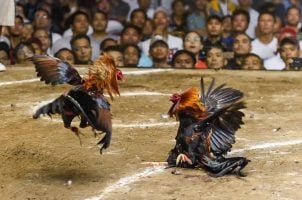Philippines National Police Want E-Sabong Officially Branded as Illegal Gambling
Posted on: February 1, 2023, 01:01h.
Last updated on: February 1, 2023, 01:21h.
Cockfighting in the Philippines remains legal. But e-sabong, online betting on the fights, was removed last year. Former President Rodrigo Duterte implemented a ban on the practice just before leaving office, and the Philippine National Police (PNP) now want to make sure there’s no confusion about its status.

Last December, the Philippines’ new president, Ferdinand Marcos, Jr., confirmed that e-sabong has no place in the country’s gambling landscape. However, it was a ban by presidential decree, without any law to address violators.
The PNP hopes to change that. Law enforcement officials are looking for more clarity so they know when and how they can react.
Need More Power
Despite the decree, e-sabong continues in the Philippines. Most of the wagering targets illegal cockfights, not the licensed fights that are found at a few locations across the country.
Even today, illegal fight organizers stream fights to thousands of viewers across the country. Many of those tune in just so they can place their bets, knowing that all of the activity has to be kept as secret as possible.
It’s not a well-kept secret, though. Several local media outlets have reported that they know exactly where the fights take place and how the operations work. Locals even receive text messages from organizers to promote the fights, while corrupt police officers receive bribes to look the other way.
PNP General Rodolfo Azurin Jr. has had enough. In a press briefing on Monday, according to the Philippine News Agency, he’s ready to lay down the law. He wants e-sabong to be included on the Philippines’ national illegal gambling register so police can attack the issue.
By adding it to the country’s anti-gambling laws, the police will have greater power to intervene and shut down e-sabong operations. It would also increase the authority to completely block offshore websites that offer the betting activity.
Azurin is the new chief of police for the PNP. Marcos appointed him to the position after he took office. He may not be in the position for long, however, as he submitted a “courtesy resignation” earlier this month. It will only become official if the Department of the Interior and Local Government accepts it, and he could leave as early as this April.
E-sabong is Alive and Well
Placing the ban on e-sabong pushed the activity underground. Illegal fights moved to clandestine locations deep in the jungles and mountains, where it’s more difficult to detect them.
The police get lucky sometimes, though. A week ago, the National Bureau of Investigation uncovered an illegal fight ring in Quezon City, according to PhilStar Global. That led to the arrest of 10 people who managed online betting.
Some operations reportedly earn as much as PHP1 billion (US$18.36 million) a day, and the people who run them are happy with the fights remaining illegal because they get to keep all of the proceeds, and not give any money to the government.
Related News Articles
Philippines Loss of e-Sabong Costs the Country More Than $87M
Philippines Offshore Gaming Operator Numbers Dwindles
Vietnam Wants To Legalize Sports Betting To Curb Black Market Wagers
Tabcorp Could Eye Bid for PointsBet Aussie Operations
Most Popular
Mirage Las Vegas Demolition to Start Next Week, Atrium a Goner
Where All the Mirage Relics Will Go
Most Commented
-
Bally’s Facing Five Months of Daily Demolition for Chicago Casino
— June 18, 2024 — 12 Comments
















No comments yet